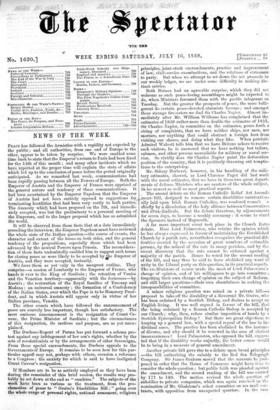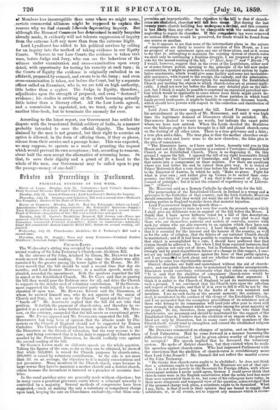If Members are to be as actively employed as they
have been during the remainder of this brief session, the results may pro- bably be set down at the end as " sundries." The subjects of the week have been as various as the treatment, from the pro- clamation of peace to " Greive's Disabilities Bill ; " going over the whole range of personal rights, national armament, religions principles, joint-stock encroachments, practice and improvement of law, civil-service examinations, and the relations of statesmen to party. But when we attempt to set down the net proceeds in our weekly ledger, we are under some difficulty in making dis- tinct entries.
Both Houses had an agreeable surprise, which they did not welcome as such peace-loving assemblages might be expected to do, when Ministers favoured them with the pacific telegrams on Tuesday. But the greater the prospects of peace, the more belli- gerent do certain peace-devoted alarmists become ; and amongst 744 these strange firi-eaters we find Sir Charles Napier. Almost im- mediately after Mr. William Williams has complained that the estimates of 1859 rather more than double the estimates of 1852, Sir Charles Napier, in committee on the estimates, pours forth a string of complaints, that we have neither ships, nor men, nor mortars, nor anything that could obstruct a foreign host from visiting our shores, and doing what they like. When patriotic Admiral Walcott tells him that we have Britons ashore to receive such visitors, he is answered that we have nothing but tailors, cabmen, and Other persons unavailable for military or naval ser- vice. So vividly does Sir Charles Napier paint the defenceless position.of the country, that it is positively throwing out tempta- tions to the enterprising.
Mr. Sidney Herberst, however, in his handling of the mili- tary estimates, showed, as Lord Clarence Paget did last week with the naval estimates, that we have in those two great depart- ments of defence Ministers who are masters of the whole subject, airs newest as well as most practical aspects.
The second debate on the Roman Catholic Relief Act Amend- – ent- Bill, designed to remove certain disabilities unintention- ally laid upon Irish Roman Catholics, was rendered remark e chiefly by a dissolution of the holy alliance between Conservatives and iiltra-Radicals. But the debate threatens, by adjournments for seven days, to become a weekly ceremony : it seems to stand the Spooners instead of Maynooth.
A far more important event took place in the Church Rates debate. Here Lord Palmerston, who retains the opinion 'which he has always expressed iu favour of maintaining the Established Church by a parish rate, nevertheless recogniies the practical dif- ficulties created by the secession of great numbers of estimable persons by the refusal of ' the rate in many parishes, and by the recent :discovery that the rate cannot be enforced against a majority of the parish. Hence he voted for the second reading` of the bill, and May thus be said to have abolished any want of unity in the Liberal party on this question, in its practical aspects. The ex-Ministers of course made the most of Lord Palmerston's change of opinion, and of his willingness to go into committee ; forgetting 'their own change of opinion on the subject of Reform, and still larger questions—their own cheerfulness in seeking the irresponsibilities of committee.
A minor religious question was raised on a private bill—a proposal to take off the disability of a Reverend Mr. Greive, who has Been ordained by a Scottish Bishop, and desires to accept an English living. It was well argued in favour" of the bill, that the being ordained by a Roman Catholic Bishop is accepted by our Church ; why, then, refuse similar imposition of hands by a Scottish Episcopalian Bishop ? But there are great objections to keeping up a general law, with a special repeal of the law in in- dividual cases. The practice has been abolished in the instance of divorce, and why should it be renewed in the case of clerical inconveniences ? Lord Palmerston, who opposed the bill, sugges- ted that if the disability works unjustly, the better course would be to bring in a measure of general amendment.
Another private bill gave rise to a debate upon broad principles .-the bill authorizing the subsidy to the Red Sea Telegraph Company. Sir James Graham moved that the measure be post- poned in order that the House of Commons might hive time to consider the whole question ; but public faith was pleaded against the amendment, and the second reading of the bill was carried by. 177 to 130. The motion revived the whole. question of subsidies to private companies, which was again renewed on the nomination of Mr. Gladstone's select committee on sea mail con- tracts, with opposition from unexpected quarters. In the case of Members less incorruptible than some whom we might name, . certain commercial alliances might be supposed to explain the reasons why we find staunch Liberals deprecating inquiry. But although the House of Commons has determined to ratify bargains already made, it evidently will not tolerate suppression of inquiry from the extreme Left any more than from the extreme Right.
Lord Lyndhurst has added to his political services by calling for an inquiry into the method of taking evidence in our Equity Courts. Whereas in our Law Courts the evidence is taken viva wee, before Judge and Jury, who can see the behaviour of the witness under examination and cross-examination upon every detail, with opportunity for testing his veracity at each turn ; in the Courts of Equity the evidence is originally embodied in an affidavit, prepared by counsel, and sworn to in the lump ; and even cross-examination is taken, not before the Court, but by a separate officer called an Examiner, who is, we are told on high authority, ittle better than a cypher. The Judge in Equity, therefore, adjudicates upon the strength of prepared, and even " doctored " evidence ; his studies in arriving at the truth becoming actually little better than a literary effort. All the Law Lords agreed, and a commission is appointed, not, we trust, only to give us another blue-book, but to terminate the anomaly for ever.



























